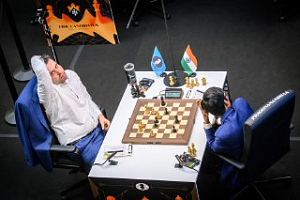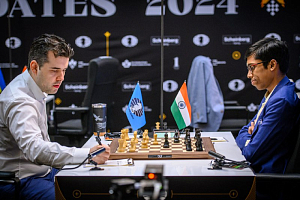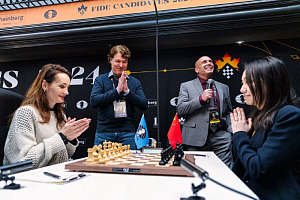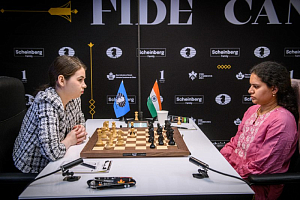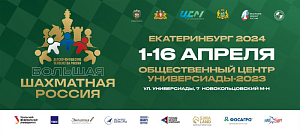Blunders and Sacrifices
Superfinals, round 1. Misha Savinov reports from St. Petersburg
On December 3, Russian Superfinals for men and women started in St. Petersburg. The event takes place in the Museum of Political History of Russia, a popular attraction with outstanding reviews, which we will surely explore a bit more as the tournaments progresses. Right now, however, I believe I should start with introducing the players to the reader.
Apologies if I am wrong, but I have a feeling that a typical English-speaking reader comes to this site really knowing only Peter Svidler, who is not only a world class player, but also a fantastic chess commentator, which certainly helps maintaining the brand awareness. Other participants of the Superfinal are more of local stars, even if they already had some international success. When I write “Sanan Sjugirov” or “Vladimir Malakhov”, the Russian reader with some experience immediately recognizes who they are and what they are capable of bringing to the table. These players (usually reasonably friendly, chess-loving, independently thinking, and with interesting hobbies apart from chess) are not just game tags or points in the crosstable. I wish you knew them a little bit better.
For now and at least in the first few reports I will concentrate on the men's event. I could cover both in the same detail, but I already envision miss Eteri K., who is in charge of the publication, giving me angry looks for the length of my first report, and I want to avoid confrontation if possible. At some point the tide will turn, and at the end I'll probably focus on the key games in both events evenly.
A few world of those who does not play. As pretty much all of you know (I assume people who are nerdy enough to read reports on Russian championships are following supertournaments as well), Sergey Karjakin and Ian Nepomniachtchi are playing in London – and Karjakin, while I am writing these lines, is stripping Magnus of half a point. Alexander Grischuk along with the leaders of our women's national team Alexandra Kosteniuk and Kateryna Lagno will play at the World Mind Sports Games in China, starting December 9.
Why there? This is exactly what I asked Mark Glukhovsky, my old friend and colleague first at kasparovchess, then at the 64 Chess Review, who is now the Executive Director of Russian Chess Federation. His answer was simple – money. There are three different time control tournaments in China, and the first prize in each of them is set around $12,000. I was unable to find exact figures, but it is quite clear that the EV of playing in Huai’an is significantly higher for the aforementioned players. We would be happy to avoid clashing the dates, but the Mind Sports Games had organizational problems and their dates were announced way too late to do anything about it.
And there is also Vladimir Kramnik, who could potentially play in the Superfinal thanks to his high rating (there are four rating spots reserved), but he is rarely in the mood to come, and his results in the past Superfinals are, let's say, not great.
Other potential Superfinalists including Evgeniy Najer, Vladislav Artemiev, Alexander Motylev, and Denis Khismatullin simply did not qualify via the Higher League. Finally, Alexander Morozevich did not even participate in the qualifier, being totally into the game of go, in which he approaches 1st amateur dan.
Without those missing, Peter Svidler and Valentina Gunina are the highest rated in addition to being the most distinguished, with seven and three Russian classical chess titles under their belts respectively. They are certainly favorites, but not overwhelming favorites.
Round 1, men
Fedoseev-Riazantsev 1-0, Dubov-Volkov 1-0, Sjugirov-Inarkiev ½-½, Matlakov-Tomashevsky ½-½, Malakhov-Romanov ½-½, Vitiugov-Svidler ½-½.
Vladimir Fedoseev vs. Alexander Riazantsev
Alexander Riazantsev is the defending champion, yet winning this prestigious title was not life-changing for him in any way. His competitive ambition seems to be restricted to the women's national team, which he coaches for several years already. Earlier this year Alexander conquered Mount Elbrus, 5,642 m, but his current rating is more than 50 points below his 5-year-old peak.
His 22-year-old opponent is on the rise, having a great year that started with topping the Aeroflot open and continued with beating none other than Vladimir Kramnik is Dortmund. Fedoseev is not lacking ambition either: in a recent interview to a major Russian newspaper he said he wants to get strong financial support and hire a team of coaches to break into the world's elite. In order to get this, one of the first steps would be to win the Superfinal, and he said he is ready to do just that. And what could be a better start than defeating the defending champ?
Fedoseev, playing White, was pretty much forced to sacrifice an exchange in order to preserve the initiative after the opening. The resulting position was probably balanced (yet risk free for White), but handling it with Black was quite uncomfortable. White could add pressure slowly, choosing Black pawns to pick up, and choosing proper moments for his breaks. Unwilling to suffer in defense (something that Sergey Karjakin excels at), Riazantsev made a counter-sacrifice, giving up his queen. He got two rooks and a glimmer of the initiative for a queen and two pawns. However, according to Fedoseev, this sacrifice was a fatal mistake, which gave White a technical position. Vladimir was certain his opponent simply misjudged the position, which wasn't calling for desperate measures yet.
Thus the defending champion, who had been undefeated with three wins last year, suffered a loss in the very first round.
Daniil Dubov vs. Sergey Volkov
The headline of this game would also be youth vs. experience. If you aren't quite familiar with Dubov, this is a good opportunity to learn more. A very bright kid from the family of mathematicians, he had been rather lazy with chess studies. In a recent interview he admitted that he had practically not studied chess until turning 16 or 17. His only source of chess information had been Kasparov's series “My Great Predecessors”, and those books plus natural talent made him a grandmaster at the age of 14! Recently Daniil started working more (one reason for this may be Kasparov not writing new stuff) and demonstrated steady progress. His third place at the World Blitz Championship is no fluke – the young man is that promising!
His chess strikes me as very disrespectful. I cannot formulate it in proper chess terms. Let's say, he doesn't take for granted that his opponents know what he knows or can do what he can. It creates very interesting dynamics in his games and makes them more exciting to follow. It also backfires at times.
Daniil is a fluent English speaker and enthusiastic chess commentator, so look forward for him joining our English commentary booth.
Sergey Volkov is the oldest participant of the Superfinal, being 43 years old. In 2000 he won the Russian championship, and this is his biggest chess feat to date. Volkov's peak rating of 2659 was achieved 10 years ago. These days he is a typical 2600-something grandmaster with a solid, but a bit dusted opening repertoire, who plays mostly against weaker opposition, i.e. in open tournaments. He narrowly qualified for the Superfinal from the 6-way tie at the Higher League thanks to a superior tie-break. How will he handle the pressure from the cream of Russian chess, is an open question. It is easy to anticipate them going all out against the rating underdog. Sergey will be forced to work hard, but he'll get his fair share of chances as well.
The today's game basically followed the script outlined above. Volkov played his pet Chebanenko Slav and quickly snatched the c4-pawn. After the game Dubov almost repeated the famous Petrosian quote, saying that when your opponent plays such openings, all you need to do is not intervene. According to Daniil, White quickly got an overwhelming position, and when he sacrificed a knight on the 13th move, he knew it will not be the first line of the machine, but it must be good enough to play for a win. White's subsequent play was natural and simple – pawn were rolling and all the pieces were joining the devastating attack... More trying to avoid the immediate defeat than to shift the momentum, Volkov sacrificed a queen for a rook, obtaining two passed pawns on b3 and c3. Dubov said that regardless of what computer may say, it was a very good practical chance, and calculating all the sharp lines was tough and unnerving. Yet, he did not make any mistakes, and White's victory became official in ten more moves.
It is interesting to note than in both games between the young and the experienced, the decisive errors were not of tactical, but of positional nature.
Sanan Sjugirov vs. Ernesto Inarkiev
Neither player lives in Elista now, but for me this is still the Elista derby. Ernesto grew up there as a player and in a way became an icon of Kalmyk chess. Sanan was born and raised in Kalmykia and was expected to replace Ernesto as a local hero, but also chose to live elsewhere and is currently representing Samara Region. Ernesto had achieved more than Sanan so far, but in terms of natural talent they are pretty close in my opinion. It feels Sanan's main obstacle on the way to more success is his innate Buddhist calmness. Omission does not blend with motivation.
It is harder to relate Ernesto Inarkiev's chess weaknesses to his character. He is one of the favorite pupils of the late Mark Dvoretsky, who was known to attack every weakness of his students with a heavy load of exercises. So Ernesto, who had been wildly aggressive in his teens, slowly turned into a more versatile pro. Yet he was unable to become a steady 2700-player or settle in the national team. Some ingredient of the magic potion was missing, and each major leap forward would soon be followed by a fall. A year ago he peaked at 2732; and now he is on a slump, falling below 2700 again.
When I asked Ernesto on their previous encounters with Sanan, he said they had played a ton, the games had always been fighting, with many wins and losses and without any advantage to either side. Well, their game today was probably the most dramatic in the round. Sjugirov, playing White, seized the initiative in the opening, properly developed it, and seemed to be on a winning track. However, as Sanan admitted with a broad smile, Ernesto's defense was nothing short of genius. Black somehow withstood the pressure, and when he game transposed to a pawn endgame, it felt like the pupil of Dvoretsky will hold it no problem. Then he suddenly pushed his king towards the center instead of advancing a weak pawn first – the move he was very critical about during a brief blindfolded post mortem. Sanan also felt this way, as he lost no time restricting the pawn and advancing his king in its direction... White broke in, and suddenly it all looked grim for Black!
Then a couple of moves later Sanan had a choice to either enter the queen ending with an extra pawn or go for a pawn ending with two. Does not sound difficult, right? Yet this was one of rare positions where having two extra pawns is not enough – Black just maintains opposition, and White has no breakthrough.
The game ended on the 72nd move with the black king stalemated on the initial square.
Maxim Matlakov vs. Evgeny Tomashevsky
The 26-year-old St. Petersburger Maxim Matlakov has the second highest rating at the tournament. He was a promising junior but by no means a child prodigy. His steady growth was largely ensured by excellent working ethic. I guess collaborating with Peter Svidler was also a factor (mutually beneficial, of course). This year Matlakov won the European championship – okay, this is just a Swiss tournament, even if a fairy strong one – and gained a lot of rating points. His current 2738 Elo is the highest of his career, and he even joined the ranks of the Russian national team for the World Team Championship in Khanty-Mansiysk. Good guy, good team player, and a good example of the almost forgotten wisdom that every man has his own pace of growth – not only those who blossom early are destined for success.
Evgeny Tomashevsky is only four years older, but is already an established star. He won Russian Superfinal once and was third twice; he participated in the FIDE Grand Prix and even won a stage; he won the European Championship 8 years ago; his nickname is Professor; he can make Legend in Hearthstone at will. Maybe I overrate Tomashevsky, but for me there was no favorite in this game, despite the lower rated player having Black in his opponent's hometown.
The game ended last, after more than six hours of play. Both commentators have already left the building (figuratively speaking, as they were yet waiting for a minivan), so the players were not called to present their thoughts to the audience. All I could ask for was a brief resume. And it was brief indeed.
“First White had an advantage. Then Black had an advantage. We both felt Black could be winning by force at some point, but neither of us could spot it. And then it was a draw”, said Evgeny Tomashevsky, standing next to his opponent near the coat check.
“Why the advantage changed hands?”
“Blunders. Many blunders”, was the answer.
And they were gone.
Vladimir Malakhov vs. Evgeny Romanov
These two players are diving time between playing and coaching jobs. Evgeny Romanov used to be a coach of the Norwegian national team, but that position no longer exists, so he returned to St. Petersburg and comes back to Norway only for specially arranged coaching sessions with his pupils. Vladimir Malakhov's most famous recent student is Valentina Gunina, and I am quite curious about details of this cooperation, as it is hard to find two players who are less alike. Malakhov is all about endgame mastery, and his opening choices never shape the position for daring attacks in Gunina's style. Having White against Romanov, the lowest rated player of the event, a potential target, Makalhov opened the game by the unassuming 1.g3, 2.Nf3, 3.g3 followed by castling.
“He probably based this choice on my game against Pavel Ponkratov from a couple of years back, which I played poorly and lost”, suggested Romanov. The game continued in a rather dry technical way, but then, according to Evgeny, his opponent overlooked Black's precise response (22...Qc8, if you are curious). The queens went off the board, and the only way for White to make progress was to go for a positional pawn sacrifice. This would lead to a dynamically balanced position, provided Black's correct response, but playing an endgame without a pawn could be against Malakhov's nature, plus he could be concerned about his tactical awareness. Whatever was the reason, White opted for simplicity, locked up the position and basically forced a draw.
Nikita Vitiugov vs. Peter Svidler
Finally, we are coming to the St. Petersburg derby, the most anticipated game of the round, judging by its average rating, but also the one with a rather predictable outcome. There is time for burning the bridges, and there is time for building them. The first round is clearly not the former.
When the arbiter Igor Bolotinsky announced the start of the clocks, Nikita took a deep breath and fell into thought. After about two minutes he came out with 1.c2-c4. Then it was time for Peter to think. It took another two minutes for 1...e7-e5 to appear. The hidden depth of those casual moves made a big impression on me. I wondered what kind of middlegame positions the grandmasters examined in their minds in order to come up with those choices.
“When you worked with someone for a long time, it is always challenging to find a playable variation against them to avoid the mutual analyses”, explained Peter Svidler (in Russian, but his English would have been much sharper, no doubt).
After Black equalized, the game almost instantly ended in a threefold repetition. Nikita wasn't one to burn the bridges. If anyone, it was Peter who could try to be more ambitious, but not without risks, which were deemed unnecessary.
Round 1, women
Gunina-Kashlinskaya 0-1, Galliamova-Kovalevskaya 1-0, Gritsayeva-Guseva 0-1, Girya-Shuvalova 1-0, Bodnaruk-Ovod ½-½, Goryachkina-Pogonina ½-½.
The cool game of the round was, as nearly always, played by Valentina Gunina, who got a good co-author in Alina Kashlinskaya. Alina's personal score against Valentina coming to the game was disastrous, something like 0-7 in classical chess and 1-10 in rapid (or the other way round, but you get the picture). However, a few days before the dreaded game she found the annotations to Smirin-Pelletier (0-1), written by Yannick, who had had a similar problem with Smirin. Inspired and armed with his psychological advice, Alina was unstoppable in the sharp middlegame, which is rightly considered Gunina's area of expertise.
Valentina looked almost stunned after the game. She quickly found her mother, and they stormed off the building, while the happy Alina joined Sergey Shipov and spent good 20 minutes explaining the game to the audience. The audience was impressed.
“Bring Alina back!”, demanded YouTube users long after Alina was gone. “Thank you, broadcast, I can finally tell the difference between Kashlinskaya and Kovalevskaya!”
And with this particularly amusing remark we will call it a day.
Photos by Vladimir Barsky














